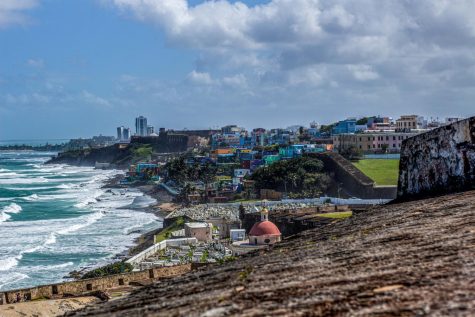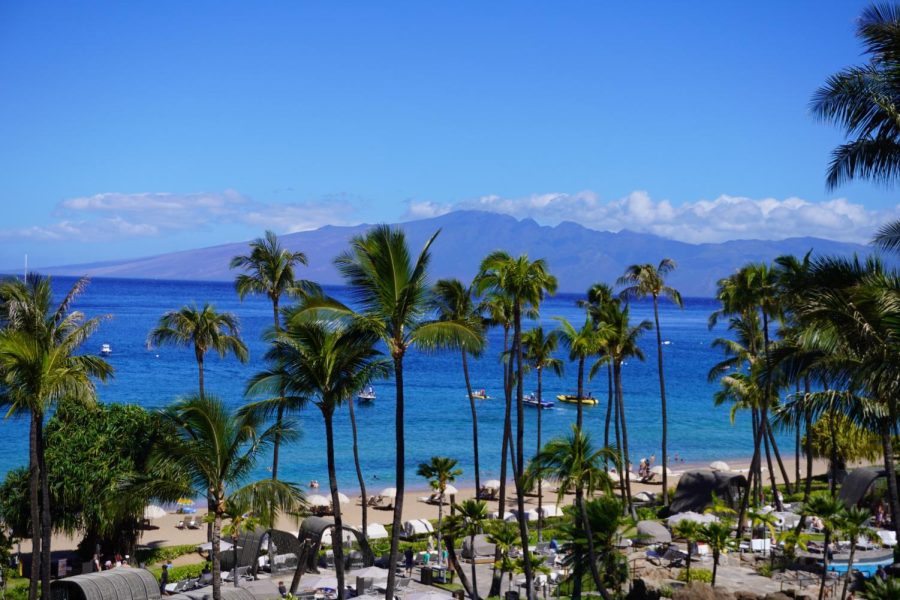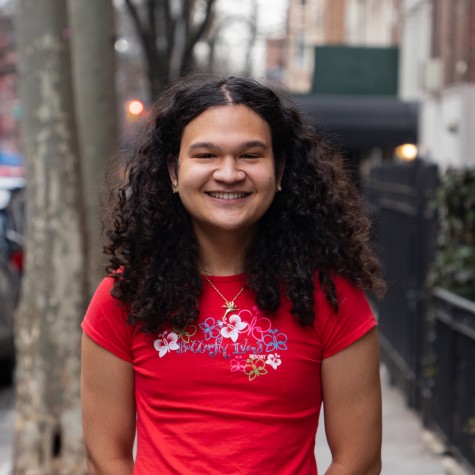Reasons to rethink tropical travel — from the people who live there
While tropical locations might sound appealing for spring break, some students who live there have different takes on tourism, especially during the COVID-19 pandemic.
Tourists can make vacation destinations unsafe for the people who actually live there. NYU students from these locations share their thoughts on tropical tourism. (Staff Photo by Roshni Raj)
March 2, 2022
Spring break is supposed to be a time for students to relax, a reprieve from the chaos of day-to-day school life. But for NYU students from tropical locations, this time of year is just as tiring as the rest of the semester. Their homes are popular vacation spots among their peers.
When Tisch senior Amanda Calderón Valero went home for winter break, she didn’t feel at home. Valero has lived in San Juan, Puerto Rico, for 22 years, and her family has lived there for three generations. Despite her familiarity with the city, the seasonal influx of tourists makes her uncomfortable.
“I feel out of place, I feel like I’m not even at home, like it’s just become a huge tourist trap in my hometown,” Calderón Valero said. “The visitors get to have fun while we don’t.”
She worries that tourism during the pandemic, especially with omicron-fueled case surges, puts the health and safety of her community at risk. As Puerto Rico struggled to provide enough COVID-19 tests to satisfy the island’s demands, local residents faced the repercussions of living on an island being overrun by tourists.
“We’re second-class citizens,” Calderón Valero said. “There is a scarcity of COVID tests, so when tourists come — and they may not follow the local rules — they might expose the locals. If we get sick we won’t have access to tests, to hospitals.”
Calderón Valero said that before the pandemic, tax incentives for outside investors were displacing Puerto Rican residents, allowing wealthy foreigners to buy land and raising the cost of living for locals. Coupled with the soaring omicron COVID-19 cases on the over-populated Caribbean island during the winter season, tourists arriving made life on Puerto Rico a burden.
Calderón Valero referenced the slogan “yo vivo donde tú vacacionas,” a Spanish phrase translating to “I live where you vacation,” but took the saying one step further.
“Yo lucho donde tú vacacionas,” Calderón Valero said — I fight where you vacation. “We don’t even live in Puerto Rico — we struggle. We struggle every day. We struggle to make a living, but still tourists get to come.”
In the country of Belize, CAS junior Saira Coye-Huhn found her home crowded with tourists over winter break. For Coye-Huhn, the president of NYU’s Native American and Indigenous Student Group, it was difficult to enjoy time in her home country with her family.
“Every time I visit Belize, I see more and more resorts owned by non-Belizeans,” she said. “More and more American flags. More and more tourists swarming our beaches and land, but I don’t see more and more successful Belizeans.”
As a Yucatec Maya person with Belizean citizenship, Coye-Huhn felt that the country’s transformation into a seasonal getaway for wealthy tourists has gravely affected the Indigenous population.
“There is the constant fear of COVID, that was brought by tourists, hurting my family or people,” Coye-Huhn said. “I have lost family to COVID [because] tourists brought us COVID.”
Aside from spreading COVID-19, Coye-Huhn explained that tourism traps locals in a system of foreign dependence. While Belize’s economy relies on tourism, she said the reliance doesn’t benefit Belizeans.
“I don’t endorse or like to see tourists in Belize or countries in similar positions, especially during the pandemic,” Coye-Huhn said. “There is a certain pain and rage you feel as you watch your land and culture get taken away from you and you can’t say anything about it because your people are forced into silence or dependency.”
Hawaii resident Makoa Kālaʻi, a Tisch senior, recounted a similar experience of having to share his islands with seasonal visitors in order to satisfy the state’s economy. For the Hilo, Hawaii’s native, staying at home during peak tourist season is more of an inconvenience than a break from the semester.
“Our local government favors a tourist economy, not a local economy,” Kālaʻi said. “It puts me and my family at higher risk of being exposed [to COVID-19] when we want to go out and eat in our hometown, at our restaurants.”
To Kālaʻi, the fantasy of a Hawaiian island getaway is a reality only for non-residents.
“My stance on tourism is in opposition,” he said. “However, the reality of the situation is that tourism in Hawaii is not going to stop.”
For residents like Kālaʻi, tourism isn’t just an issue of crowded beaches and heavy traffic — it also threatens his culture.
“We are impacted and at higher risk because these people crave an experience of paradise, but really it’s just inconveniencing me and my community,” Kālaʻi said.

Unlike vacations to large cities like New York City or attractions like Disneyland, tropical vacations make life unsustainable for local communities. In a paper from the University of Puerto Rico titled “Long-Term Impacts of Non-Sustainable Tourism and Urban Development in Small Tropical Islands Coastal Habitats in a Changing Climate: Lessons Learned from Puerto Rico,” tourism is found to drive the economy of many coastal areas, yet this development continues without the participation and integration of community members and without revenue retribution to the local communities.
While local residents should not be the only ones looking for solutions, these NYU students have a few suggestions for anyone seeking a slice of so-called paradise this upcoming spring break.
“Don’t go just for your enjoyment, go to learn,” Calderón Valero said. “Leave your money at local places, leave your money where we can benefit from it, shop local, or leave tourist trap areas and expand your knowledge. Find someplace where your presence isn’t hurting the local people.”
Like Calderón Valero, Kālaʻi imagines a future where tourism can be beneficial to the local people and economy.
“I wish that tourism could be reframed into more of an educational experience on the type of communities that reside in tourist destinations, as opposed to a vacation destination where it’s all about the tourist feeding the self,” Kālaʻi said. “I don’t see a realistic world where that can happen, but I can dream.”
Coye-Huhn does not bother to think in ideals. Like Kālaʻi, an educational focus would be ideal — but with the dire effects of the pandemic on her local community, she wants a future with no tourism at all.
“Ask yourself, are you going to Belize or Hawaii or wherever because you really care to immerse yourself in the country or culture or to support the people or do you just want a backdrop and some servants?” Coye-Huhn said. “There are beaches in mainland America or probably wherever you live.”
NYU closes for spring break in less than two weeks. Perhaps NYU students eagerly looking for a getaway should take note of how tourism affects the people living where they vacation.
“Tourists have never cared about the people of the land they are occupying, and the pandemic highlighted that for me,” Coye-Huhn says. “It really shows that tourism, especially in countries like Belize or stolen nations like Hawaii, is just an extension of our colonization. There can never be anything ethical about that.”
Contact Derek Kamakanaaloha Soong at [email protected].



























































































































































